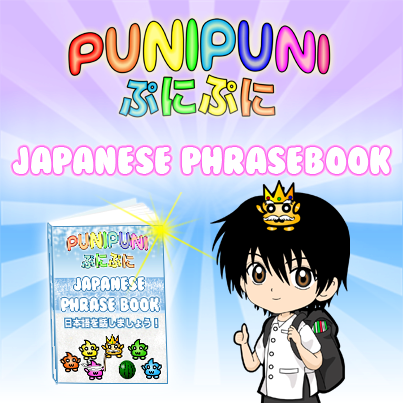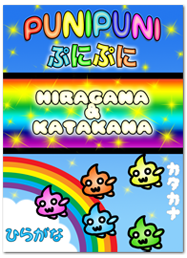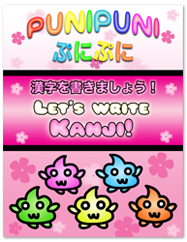☆ PuniPuni Youtube ☆
Japanese Grammar: Indefinite Expressions – Review Notes
In English, indefinite expressions are words like something, someone, and somewhere.
Today we will learn how to make indefinite expressions in Japanese using question words plusか (ka). (◕ω<)☆
………………………………………………………………………………..
How to make Indefinite Expressions

★ Today we will learn how to make indefinite expressions in Japanese using question words plus か (ka).

★ First of all, what is an indefinite expression in English? Although you might not know their name, you use them every day!
★ Indefinite expressions in English always start with some~.

★ Some examples of indefinite expressions in English include: somewhere, someone, and something.
★ As you can tell from the name, indefinite expressions are expressions that are not specifically defined.

★ In Japanese, indefinite expressions always end in か (ka).

★ If you already know question words in Japanese, it is easy to make indefinite expressions! In case you don’t know them yet, here are the ones that we focused on in today’s lesson!
何 (なに – nani) = What?
どこ (doko) = Where?
誰 (だれ – dare) = Who?
いつ (itsu) = When?

★ All you have to do to make the indefinite expression is add か (ka) to the end of the question word!
★ So, 何 (なに – nani) – what – becomes 何か (なにか – nanika) – something!
★ どこ (doko) – where – becomes どこか (dokoka) – somewhere!
★ 誰 (だれ – dare) – who – becomes 誰か (だれか – dareka) – someone!
★ いつ (itsu) – when – becomes いつか (itsuka) – sometime/someday!
………………………………………………………………………………..
Example Sentence 1:
何か飲みますか?
Nanika nomimasu ka?
Will you drink something?
………………………………………………………………………………..
Example Sentence 2:
どこかに行きたいですか?
Dokoka ni ikitai desu ka?
Do you want to go somewhere?
………………………………………………………………………………..
Example Sentence 3:
誰かがいますか?
Dareka ga imasu ka?
Is someone there?
………………………………………………………………………………..
Example Sentence 4:
いつか日本に行きたいですか?
Itsuka nihon ni ikitai desu ka?
Do you want to go to Japan someday?
………………………………………………………………………………..
Conclusion:
Today we learned how to make indefinite expressions in Japanese!
These words are used every day in both Japanese and English, so try to remember them and practice using them whenever you can!
………………………………………………………………………………..
Do you want a Japanese tutor?
Take Japanese Skype Lessons with Professional Japanese Teachers on kakehashijapan.com!
………………………………………………………………………………..
………………………………………………………………………………..













7 comments
When you wrote “どこかに行きたいですか?” and “いつか日本に行きたいですか?”, I thought that “です” doesn’t go with a verb, or is it because it is “ですか”? I’m not sure.
Comment by Majic on 08/02/2013 at 8:35 pmYou would not use です with a verb in regular 〜ます form but when you use the 〜たい form of the verb, you use です in formal speech.
Comment by PuniPuni on 08/13/2013 at 10:25 pmI think the desu just makes it polite. Without the desu it’s casual.
Comment by AJ on 08/04/2013 at 3:12 pmこんにちは:)
Comment by クレア on 08/08/2013 at 3:29 amLove your website..so cute ^_^ and most of all lots of learnings..
May I ask, what does ぷにぷに mean?
ありがとうございました。大変参考になりました。
Comment by Majic on 08/18/2013 at 4:42 pmCan i use it in a positive way? I mean, all the examples are in question form, so, can i say something like “i have something” using nanika?
Comment by Celes on 06/05/2014 at 10:29 amThanks!
You can use it in a normal sentence too. For example, 私は何かを持っています。(watashi wa nanika o motteimasu – “I have something.”)
Comment by PuniPuni on 06/06/2014 at 10:27 am